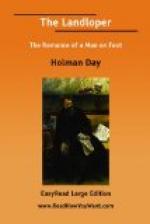“I hope that some day I may go to Tadousac,” said Farr to the girl, before he passed out of the good woman’s house. “I would like to see the sunset, for you have praised it.”
“Ask for the house of Onesime Dionne, second beyond the big parish cross. It will be easy to find, and the sunset is very grand from the porch under the eaves.”
Farr went along with the old man and they walked slowly. Their way took them down narrow streets between the high tenements.
“Yes, you shall find it very grand at Tadousac—and M’sieu’ Dionne is an honest man,” declared Etienne. “Now and then in the thirty year I have been visit up there in Tadousac, and I sit those day and whittle for the children and then little Zelie trot on my knee with the others. So I know the story of those place. And all the people up there don’t care if I know, because I listen and am glad to know, and sometimes I can give advice, for I have live long on the States where great matters are happening. But Farmer Leroux would not listen to me when I advise about his good son Jean and Zelie Dionne. Farmer Leroux is a good man, but he is a hard man when his ugly mad get stir. And the children up there do what the father tell—because that is what the cure preach and it is the way of the habitants.”
“The old, old story—the Montagues and the Capulets on the banks of the river of the North.”
“I think I know something what you mean, m’sieu’, though I don’t know your friend you speak about. But if he say to his son, ’Ba gar, you don’t marry no girl what I don’t like her fadder because we have hosswhip one anodder t’ree or two time when we have fuss over line fence—or crowd our wagon when we go to market’—why, then that’s your friend. And it start from there and grow into big thing, so that all the cure can say it don’t make no friend of them. So they wait—Jean and Zelie! Ah yes, they wait!” He put his finger beside his nose and winked. “They love. They get marry some nice day. But now!” He flirted his gaunt fingers. “They say nottings. I maself say nottings. But I see some very queer look in Jean Leroux’s eye when he say to me as I meet him at the gate of his fadder’s farm, ’And how carries Zelie Dionne herself these days?’ And though he look high over the tree and chew the straw and look very careless, ah, I see the big tear in his eye and hear him choke in his throat.”
“It’s played out and old-fashioned, this letting old folks manage young folks that way just to satisfy old grudges,” scoffed Farr. “If they are in love they ought to get married and tell the old folks to go hang!”
Etienne stopped and gazed quizzically at the young man who thus expounded the law for lovers.
“I think you have in you none of the understanding of the French habitants who have live the three generation on one farm so that a young man, no matter if he love a mam’selle so very much that all the bread he eat taste ashes in his mouth—ah, he cannot say ’I will leave—I will go!’ For then that young man must turn himself to be anodder young man—and the habitant does not so change.”




